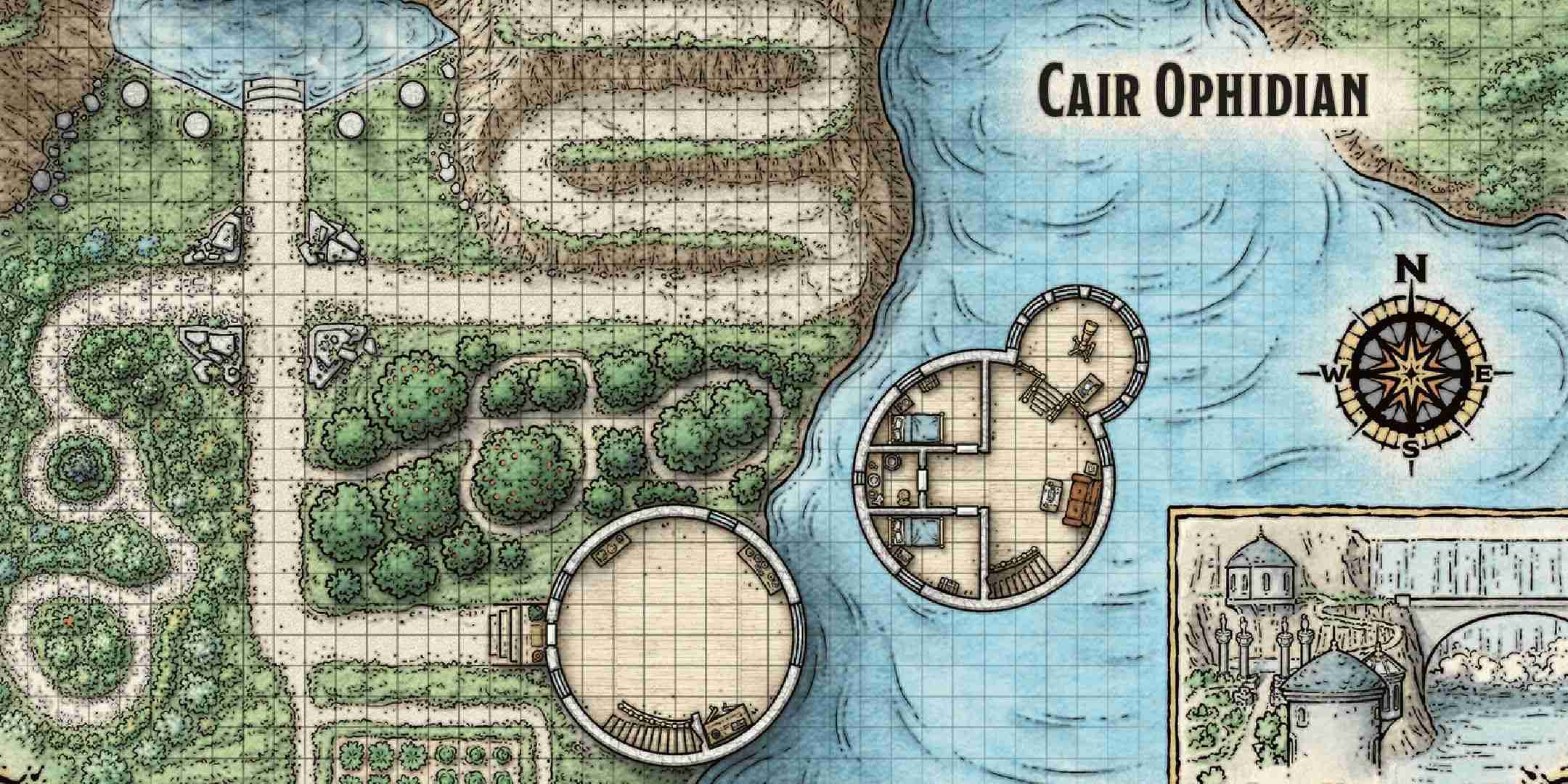
A player’s bastion in Dungeons & Dragons is a deeply personal area, a zone of their control that they can call home. If your Dungeon Master allows them to be used, you might want to know what the best facility choices are for druids since they are rarely described as characters that own real estate.

Well, not only can druids have bastions just like everyone else, but they also have access to some exclusive facilities thanks to their druidic focus. In this guide, we will cover the best facilities for a druid, as well as a few spells that can help you make the most out of your bastion.

You can gain a bastion as early as level five, which contains two basic facilities and two special facilities. You design how your bastion is organized, and you can spend money on having more basic facilities, but you only get special ones at specific levels.
Visually, your bastion can be whatever you want it to be, so don’t feel limited by the pictures depicting castles and towers. It could be a cave system or a cozy cabin in the woods; as long as it has room to hold the facilities and a roof, your DM will likely agree to nearly anything.
As far as basic facilities go, we won’t go into too much detail here since they only serve roleplay purposes. At your Dungeon Master’s discretion, you could have them be more nature-themed places, like a yard filled with trees and wildlife.

From the special facilities available to you at level five, the sanctuary is one of the most exclusive ones. Available only to characters with a holy symbol or druidic focus, spending a long rest here gives you a charm, letting you cast Healing Word once in the next seven days without spending a spell slot.
If you spend too much time away from your bastion, there is a chance of it being attacked, so having a barrack as your second special facility can help you protect it. You can recruit several protectors here, keeping the place safe in case the area is invaded.
You can also build walls all around your bastion to improve the effectiveness of your defenders, but they are too expensive to build at these early levels.
Of course, if you keep issuing orders to your bastion, it can’t be attacked, and in that case, you are better off having a garden instead of a barrack. Other than fitting the druid aesthetic, you can get a free potion of healing from the garden once per week, among other goods like rations and antitoxins.

Communicating with your Bastion while you are away is key to making the most out of it, and by level five, druids will already have a way to do so. Animal Messenger is a great spell to prepare a bastion turn, sending a little bird to issue orders for you to your hirelings.
Of course, if you are too far away, then the spell might not work, so keep distances in mind. An animal that can fly will cover 50 miles per day, and casting Animal Messenger with a third level spell slot makes the creature travel for three days, so you can have an idea of how far creatures can go as you adventure.

At level nine, several new options for special facilities will open for you, and you’ll be able to add two new special facilities to the bastion. You can also replace facilities each time you level up, something to consider if you don’t end up using some of them: for example, replacing the barracks due to spending most of your time at your bastion.

The sacristy is another special facility exclusive to characters with druid focus and holy symbols, letting you create holy water for free. You can also create common and uncommon relics, but you do need to pay the cost of producing them, although it is only half of what it would cost to buy them outright.
The teleportation circle is a key facility to get to your bastion quickly, but how useful it is depends on how many settlements you come across with their own teleportation circles.
Of course, if the party has one single bastion or they are all close together, only one of you should have a teleportation circle.
The workshop is a facility you have already had access to since level five, but it only gets good for you at level nine. Now, a workshop can create common and uncommon implements, although you need to craft them yourself if the item lets you cast a spell.

If you choose to have a garden at level five, then you should replace it with a greenhouse. It is basically a direct upgrade to the garden, with the only thing of note it can do is generate rations, something that shouldn’t be a problem for a druid that can cast Goodberry.

Level 13 unlocks a new tier of special facilities, although you can only add one new one. Some facilities that you already had access to also gain new interesting improvements, but as a druid, those might be a little limited, especially if you are a circle of the moon druid who has little use for most magic items.

One of the better facilities unlocked at level 13 is the meditation chamber, letting you gain advantage on two kinds of saving throws for a week if you spend seven days in your bastion. It also lets you roll twice during your next bastion event if you empower it, letting you choose either result.
If you don’t like the meditation chamber and you’d rather be making gold, now it's a great time to have a storehouse. At level 13, you can invest 5,000 gold in it and earn 7,500 in seven days (making it a 50 percent profit), not a huge amount of gold but a net gain nonetheless.
If you are deep into roleplay, then an interesting option for druids is the menagerie, although it doesn’t have a clear function beyond using animals as bastion defenders. You could roleplay the barracks being filled with animals, and it would work just the same at your DM’s discretion.

As a druid, you will now have access to the reliquary, which is just a sanctuary but better. Whatever the sanctuary gives you is no longer needed at level 13, and the reliquary is a must-have, with a charm that gives you access to a free cast of Greater Restoration as well as a talisman to make up for component costs for spells.

If you have a teleportation circle in your bastion (or one of your party members has one), then the Plane Shift spell can be very useful for you and your party.
You normally use it to get transported to the vicinity of a place, but if you know the teleportation sequence, you can get to that teleportation circle instead.
This is great for planar travel, as it potentially works when traveling on the same plane at your DM’s discretion. Based on the rules as written, it shouldn’t work, but since druids don’t have access to Teleport, they might let you use it to get to your bastion.

Adventuring parties rarely make it to the late stages of play, but if you do, you’ll end up gaining access to the most powerful bastion options around. You only gain one new special facility, but thanks to the replacement option, you can use more than one of these powerful facilities.

Druids can’t normally gain access to a guild hall since it requires expertise in a skill, but there are several feats that can help you meet that requirement. You could have a Masons Guild to build walls around your bastion for free, or create a druidic guild with your DM and make it entirely your own.

You now have access to the sanctum, which is as much an upgrade to the reliquary as it was for the sanctuary before. You gain the following:
By this level, you'll be able to enjoy all the benefits of a Bastion and how useful they can be, even when you aren't spending time there.

The above is the detailed content of Dungeons & Dragons: Best Druid Bastion Build. For more information, please follow other related articles on the PHP Chinese website!




